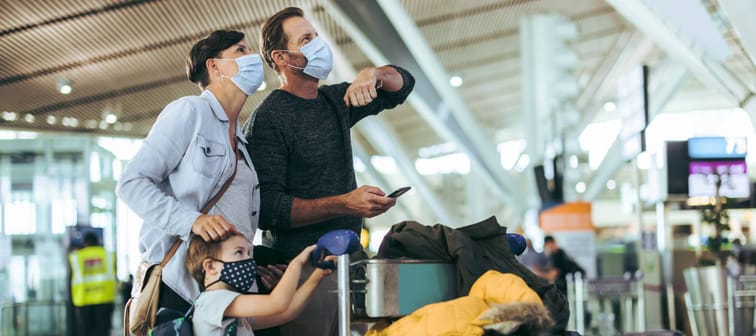Canada flight delay compensation: Know your rights
Amidst the chaos, plenty of would-be travellers have become more knowledgeable about their rights. Air passenger rights in Canada are meant to compensate consumers if their flights are delayed or their baggage is lost.
According to the Canadian Transport Agency (CTA), travellers are eligible for reimbursement up to $2,350 if their baggage is “damaged, delayed or lost” during domestic or international travel. Passengers are also eligible for reimbursements between $125 and $1,000 if their flight is delayed more than three hours. However, you’ll need to go through a lengthy process to make a claim, and the CTA website says it could take more than 18 months for your complaint to be reviewed.
While relying on government legislated air travel compensation is one way to mitigate the financial cost of flight delays and trip interruption, it's not a speedy process — nor is it guarenteed. Instead, consider other options for travel insurance, such as credit card travel insurance, third-party travel insurance, provincial health care plans, employee benefits packages, along with smart trip planning. To help, here are the five additional options that can help compensate you for unforeseen medical emergencies, trip cancellation or delay and lost or stolen luggage.
Importance of trip cancellation insurance and flight delay compensation
According to surveys of U.S. and U.K. travellers, released by [Which?] (https://www.which.co.uk/about-which), a not-for-profit U.K.-based consumer comparison site, the top two most common reasons to make a claim are trip cancellation and health-related claims. For U.S. travellers, the third reason to make a travel insurance claim was for lost, damaged or stolen luggage, while U.K. travellers claimed for transportation and flight delays.
Although every policy differs, trip coverage may include trip cancellation insurance, trip interruption insurance, flight cancellation insurance, flight delay compensation and insurance for lost, damaged or stolen baggage.
Like any insurance policy, you can find policies with varying degrees of coverage. Some only reimburse you when certain conditions are met, while more comprehensive coverage is found in policies offering “cancel for any reason” coverage. How much you’ll spend on travel insurance depends on where you live, where you plan to travel, your age, the value of your vacation, how long the trip will be and whether the policy includes medical coverage.
Generally speaking, if you’re under 65 and have no pre-existing health issues, an annual multi-trip premium policy will cost you about $250. This would cover travel medical and extended travel insurance for any trips you take throughout the year, up to a maximum number of days. If you purchase a travel insurance policy, be sure to shop around for the best extra travel insurance.
Maximize Your Tax Refund with TurboTax Canada!
Simplify tax season with this user-friendly software. Get step-by-step guidance, maximize deductions, and file with confidence. Trusted by millions, TurboTax Canada ensures accuracy and peace of mind. Start your taxes today and get the refund you deserve
Get the tax refund you deserveStart with free coverage offered by credit cards
It’s also possible to get free travel insurance through your credit card. Many premium travel credit cards offer comprehensive travel insurance packages. The catch is that you must charge a certain amount of your trip expenses — or specific trip costs — to your credit card for the credit card travel insurance to be valid.
For instance, if you need to claim flight delay compensation, you must pay for the airline tickets using that credit card. To claim against your trip cancellation insurance or trip interruption insurance, you need to pay for hotels and transportation costs with that credit card.
On the plus side, if your credit card offers emergency travel medical insurance, you don’t need to charge your flights or hotels to the card for your policy to be valid. As long as your credit card account is in good standing — no missed payments — you can submit a claim.
Some good options for trip cancellation and trip interruption coverage through Visa cards include:
Some good options for trip cancellation and trip interruption coverage through Mastercard include:
Some good options for trip cancellation and trip interruption coverage through American Express cards include:
What does credit card travel insurance cover?
Barry Choi, Money.ca contributor and a Toronto-based personal finance and travel expert, explains that while policies may differ, “the most common types of extended travel insurance” cover the following situations:
- Travel medical coverage. Most credit cards cover the cardholder (and close family members travelling with the cardholder) for a specific period of days, based on your age, up to a set maximum claim amount. For instance, the BMO Ascend World Elite Mastercard offers 31-day medical protection coverage.
- Travel accident coverage If you suffer dismemberment or accidental death while travelling, you or your beneficiary will be paid a lump sum, according to the credit card coverage limits, says Choi.
- Trip cancellation insurance. As Choi explains, this coverage protects you if you need to cancel your trip before departure. Just be aware that this credit card trip insurance may come with conditions and designated “qualifying reasons.” Qualifying reasons are accepted reasons that will prompt coverage and reimburse you the claim amount. The most common reasons are job loss or a death in the family.
- Trip interruption insurance. If you need to return home early for a qualifying reason, explains Choi, this credit card trip insurance will reimburse some of your non-refundable trip expenses.
- Flight delay compensation. When your flight is delayed by a certain amount of time (dependent on the policy), flight delay insurance will cover costs such as accommodations and meals, says Choi.
- Delayed, lost or stolen baggage. If your luggage is delayed (a minimum of four hours), lost or significantly damaged, you can make a claim and be reimbursed. Plus, this credit card insurance allows you to claim any items you need to purchase, such as clothes and toiletries, until you get your bag back, says Choi.
- Car rental insurance. This credit card insurance covers damage or theft to rental cars. However, it doesn’t come with third-party liability insurance, which would help cover costs if you are sued for bodily harm, says Choi.
- Loss or theft from travel accommodation. You can be reimbursed for the cost of personal items stolen from your hotel, motel or travel accommodations.
What happens if I pay using travel rewards or points?
It gets more complicated if you use rewards or points to pay for your trip.
Most credit card insurance policies require that the credit card account be in good standing, with no outstanding balance owed prior to the trip, for the insurance to be valid. Plus, there are spending requirements.
For most credit cards, all costs associated with trip insurance — such as flights, hotels, and transportation — must be paid using the card, either in points or as a standard charge.
Some credit cards, such as the Scotiabank Gold Amex or the National Bank World Elite Mastercard, only require 75% of your trip costs to be charged to the card.
In most cases, this isn’t a big deal for consumers.
However, it could be a problem if you redeemed points to help pay for your trip. In most cases, if you make a travel insurance claim against your credit card insurance, the points spent on the trip will be reinstated (with a penalty) to your account. If you paid a mixture of points and cash, the points would be reimbursed, and the total paid out-of-pocket would be eligible for claim reimbursement.
What happens if I pay for a loved one, but I won’t be travelling with them?
Trip insurance and coverage, through a credit card, only protects the credit card holder and close family travelling with the credit card holder (although, always read the fine print, as not all cards cover loved ones in trip insurance coverage).
If you end up paying for a loved one’s trip but are not travelling with this person, the credit card trip insurance coverage will not cover their trip — or reimburse you for any costs associated with trip cancellation, interruption or loss.
Emergency medical coverage: Start with your provincial health plan
Trip protection can cover a variety of circumstances, from minor inconveniences to major medical situations. While credit cards can offer medical insurance coverage, it may not be sufficient for your needs. Instead, you may want to consider purchasing extended travel insurance — with or without additional medical coverage.
But before you shell out good cash for travel medical insurance, check out the basic coverage offered by your government health care plan.
For instance, Ontario’s provincial plan (OHIP) offers out-of-country coverage for some medical emergencies unrelated to a pre-existing condition under certain conditions. The Ontario government recommends that you take your health card with you when you travel and that you also buy private health insurance. Residents in other provinces can find similar coverage from their provincial health plans.
The benefit is that travel insurance coverage under a provincial health plan is available at no extra cost. However, if you face an emergency, you’ll need to pay your medical expenses upfront and then apply for reimbursement when you return to your province of residence. Be sure to keep receipts for all care costs. Keep in mind that limits to the amount of coverage could mean you’ll only be reimbursed for a percentage of the actual costs. Plus, many emergency medical services may not be covered, such as ambulances and prescriptions.
This protection also won’t cover non-medical losses such as trip cancellation, trip interruption or lost or damaged luggage — although your homeowner’s insurance policy may cover lost or damaged baggage and other belongings. The problem with claiming against your homeowner’s policy is that repeat claims will prompt an increase in premiums, so it often doesn’t make sense to make a claim against your home insurance policy. This is one reason why many travellers opt to purchase third-party travel insurance — known as extended travel insurance — found through a credit card provider, a travel insurance provider or through an employer benefits package.
Grow Your Savings Effortlessly with Moka
Automate your savings with every purchase and watch your money multiply. Moka rounds up your transactions and invests the spare change. Start building wealth effortlessly today. Join thousands of Canadians embracing financial freedom with Moka
Sign up nowDon’t forget your employee plan
Before spending money on extra coverage, check to see if your employer offers extended travel coverage. Many employee benefit packages include travel insurance with medical and extended protection. These policies can vary significantly in the amount and types of coverage it provides. As such, the coverage and limits may not be suitable for your specific needs. It’s important to review your employer-provided package carefully to understand its coverage and decide whether you might need to top it up either with credit card travel insurance coverage or with a separate travel insurance policy.
Travel insurance alternatives
Besides travel insurance, there are a few other ways to protect yourself if you’re unsure of your travel plans.
Booking fully refundable hotels and flights is one way to make things foolproof. This can be better than travel insurance since you can cancel anytime and get a full refund. That said, you’ll pay a premium for this privilege, and it won’t help you if your bags are delayed or if your possessions are stolen from your hotel.
Final thoughts
Some people may think travel insurance is an unnecessary expense. However, like any insurance policy, you’ll be glad you have it if you ever need to make a claim.
Sponsored
Trade Smarter, Today
With CIBC Investor's Edge, kick-start your portfolio with 100 free trades and up to $4,500 cash back.




